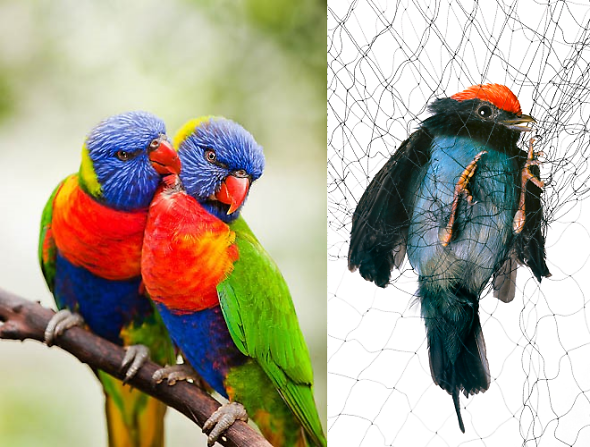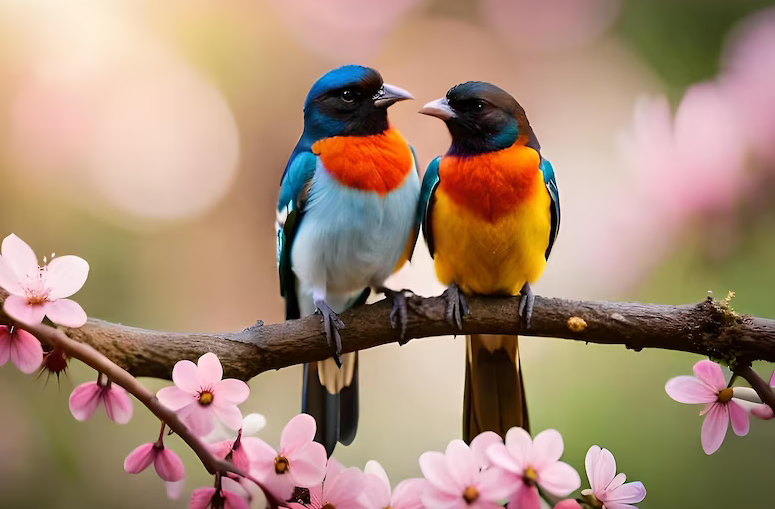
THE STORY OF THE KULIṄGA BIRDS – (SB 7.2.50)
There was once a hunter who lured birds with food and captured them after spreading a net. He lived as if appointed by death personified as the killer of the birds.
While wandering in the forest, the hunter saw a pair of kuliṅga birds. Of the two, the female was captivated by the hunter’s lure.
O queens of Suyajña, the male kuliṅga bird, seeing his wife put into the greatest danger in the grip of Providence, became very unhappy. Because of affection, the poor bird, being unable to release her, began to lament for his wife.
Alas, how merciless is Providence! My wife, unable to be helped by anyone, is in such an awkward position and lamenting for me. What will Providence gain by taking away this poor bird? What will be the profit?
If unkind Providence takes away my wife, who is half my body, why should He not take me also? What is the use of my living with half of my body, bereaved by loss of my wife? What shall I gain in this way?
The unfortunate baby birds, bereft of their mother, are waiting in the nest for her to feed them. They are still very small and have not yet grown their wings. How shall I be able to maintain them?
Because of the loss of his wife, the kuliṅga bird lamented with tears in his eyes. Meanwhile, following the dictations of mature time, the hunter, who was very carefully hidden in the distance, released his arrow, which pierced the body of the kuliṅga bird and killed him.
The bird is lamenting for the mother of his children because the mother naturally maintains and cares for the children. Yamarāja, however, in the guise of a small boy, has already explained that although his mother left him uncared for and wandering in the forest, the tigers and other ferocious animals had not eaten him. The real fact is that if the Supreme Personality of Godhead protects one, even though one be motherless and fatherless, one can be maintained by the good will of the Lord. Otherwise, if the Supreme Lord does not give one protection, one must suffer in spite of the presence of his father and mother. Another example is that sometimes a patient dies in spite of a good physician and good medicine. Thus without the protection of the Lord one cannot live, with or without parents.
Another point in this verse is that fathers and mothers have protective feelings for their children even in bird and beast society, not to speak of human society. Kali-yuga, however, is so degraded that a father and mother even kill their children in the womb on the plea of their scientific knowledge that within the womb the child has no life. Prestigious medical practitioners give this opinion, and therefore the father and mother of this day kill their children within the womb. How degraded human society has become! Their scientific knowledge is so advanced that they think that within the egg and the embryo there is no life. Now these so-called scientists are receiving Nobel Prizes for advancing the theory of chemical evolution. But if chemical combinations are the source of life, why don’t the scientists manufacture something like an egg through chemistry and put it in an incubator so that a chicken will come out? What is their answer? With their scientific knowledge they are unable to create even an egg. Such scientists are described in Bhagavad-gītā as māyayāpahṛta jñānāḥ, fools whose real knowledge has been taken away. They are not men of knowledge, but they pose as scientists and philosophers, although their so-called theoretical knowledge cannot produce practical results.
What is the Most Wonderful Thing within this World?
Yamarāja once asked Mahārāja Yudhiṣṭhira, “What is the most wonderful thing within this world?” Mahārāja Yudhiṣṭhira replied (Mahābhārata, Vana-parva 313.116):
अहन्य् अहनि भूतानि गच्छन्तीह यमालयम्
शेषाः स्थावरम् इच्छन्ति किम् आश्चर्यम् अतः परम्
ahany ahani bhūtāni – gacchantīha yamālayam
śeṣāḥ sthāvaram icchanti – kim āścaryam ataḥ param
“Hundreds and thousands of living entities meet death at every moment, but a foolish living being nonetheless thinks himself deathless and does not prepare for death. This is the most wonderful thing in this world.”
“Everyone has to die because everyone is fully under the control of material nature, yet everyone thinks that he is independent, that whatever he likes he can do, that he will never meet death but live forever, and so on. So-called scientists are making various plans by which living entities in the future can live forever, but while they are thus pursuing such scientific knowledge, Yamaraja, in due course of time, will take them away from their business of so-called research.” (SB 7.2.57 Purport)
Every minute and every second we experience that living entities are going to the temple of death. Men, insects, animals, birds—everyone is going. This world, therefore, is called mrityuloka—the planet of death. Every day there are obituaries, and if we bother to go to the cemetery or crematorium grounds we can validate them. Yet everyone is thinking, “Somehow or other I’ll live.” Everyone is subject to the law of death, yet no one takes it seriously. This is illusion. Thinking we will live forever, we go on doing whatever we like, feeling that we will never be held responsible. This is a very risky life, and it is the densest part of illusion. We should become very serious and understand that death is waiting. We have heard the expression, “as sure as death.” This means that in this world death is the most certain thing; no one can avoid it. When death comes, no longer will our puffed-up philosophy or advanced degrees help us. At that time our stout and strong body and our intelligence—which don’t care for anything—are vanquished.








Speak Your Mind